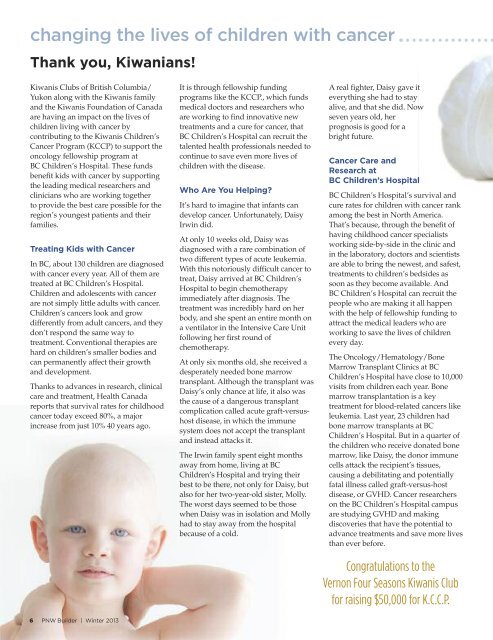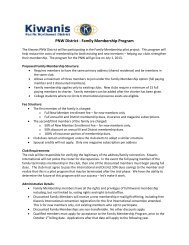Winter 2013 - Kiwanis Pacific Northwest District
Winter 2013 - Kiwanis Pacific Northwest District
Winter 2013 - Kiwanis Pacific Northwest District
Create successful ePaper yourself
Turn your PDF publications into a flip-book with our unique Google optimized e-Paper software.
changing the lives of children with cancer<br />
Thank you, Kiwanians!<br />
<strong>Kiwanis</strong> Clubs of British Columbia/<br />
Yukon along with the <strong>Kiwanis</strong> family<br />
and the <strong>Kiwanis</strong> Foundation of Canada<br />
are having an impact on the lives of<br />
children living with cancer by<br />
contributing to the <strong>Kiwanis</strong> Children’s<br />
Cancer Program (KCCP) to support the<br />
oncology fellowship program at<br />
BC Children’s Hospital. These funds<br />
benefit kids with cancer by supporting<br />
the leading medical researchers and<br />
clinicians who are working together<br />
to provide the best care possible for the<br />
region’s youngest patients and their<br />
families.<br />
Treating Kids with Cancer<br />
In BC, about 130 children are diagnosed<br />
with cancer every year. All of them are<br />
treated at BC Children’s Hospital.<br />
Children and adolescents with cancer<br />
are not simply little adults with cancer.<br />
Children’s cancers look and grow<br />
differently from adult cancers, and they<br />
don’t respond the same way to<br />
treatment. Conventional therapies are<br />
hard on children’s smaller bodies and<br />
can permanently affect their growth<br />
and development.<br />
Thanks to advances in research, clinical<br />
care and treatment, Health Canada<br />
reports that survival rates for childhood<br />
cancer today exceed 80%, a major<br />
increase from just 10% 40 years ago.<br />
6 PNW Builder | <strong>Winter</strong> <strong>2013</strong><br />
It is through fellowship funding<br />
programs like the KCCP., which funds<br />
medical doctors and researchers who<br />
are working to find innovative new<br />
treatments and a cure for cancer, that<br />
BC Children’s Hospital can recruit the<br />
talented health professionals needed to<br />
continue to save even more lives of<br />
children with the disease.<br />
Who Are You Helping?<br />
It’s hard to imagine that infants can<br />
develop cancer. Unfortunately, Daisy<br />
Irwin did.<br />
At only 10 weeks old, Daisy was<br />
diagnosed with a rare combination of<br />
two different types of acute leukemia.<br />
With this notoriously difficult cancer to<br />
treat, Daisy arrived at BC Children’s<br />
Hospital to begin chemotherapy<br />
immediately after diagnosis. The<br />
treatment was incredibly hard on her<br />
body, and she spent an entire month on<br />
a ventilator in the Intensive Care Unit<br />
following her first round of<br />
chemotherapy.<br />
At only six months old, she received a<br />
desperately needed bone marrow<br />
transplant. Although the transplant was<br />
Daisy’s only chance at life, it also was<br />
the cause of a dangerous transplant<br />
complication called acute graft-versushost<br />
disease, in which the immune<br />
system does not accept the transplant<br />
and instead attacks it.<br />
The Irwin family spent eight months<br />
away from home, living at BC<br />
Children’s Hospital and trying their<br />
best to be there, not only for Daisy, but<br />
also for her two-year-old sister, Molly.<br />
The worst days seemed to be those<br />
when Daisy was in isolation and Molly<br />
had to stay away from the hospital<br />
because of a cold.<br />
A real fighter, Daisy gave it<br />
everything she had to stay<br />
alive, and that she did. Now<br />
seven years old, her<br />
prognosis is good for a<br />
bright future.<br />
Cancer Care and<br />
Research at<br />
BC Children’s Hospital<br />
BC Children’s Hospital’s survival and<br />
cure rates for children with cancer rank<br />
among the best in North America.<br />
That’s because, through the benefit of<br />
having childhood cancer specialists<br />
working side-by-side in the clinic and<br />
in the laboratory, doctors and scientists<br />
are able to bring the newest, and safest,<br />
treatments to children’s bedsides as<br />
soon as they become available. And<br />
BC Children’s Hospital can recruit the<br />
people who are making it all happen<br />
with the help of fellowship funding to<br />
attract the medical leaders who are<br />
working to save the lives of children<br />
every day.<br />
The Oncology/Hematology/Bone<br />
Marrow Transplant Clinics at BC<br />
Children’s Hospital have close to 10,000<br />
visits from children each year. Bone<br />
marrow transplantation is a key<br />
treatment for blood-related cancers like<br />
leukemia. Last year, 23 children had<br />
bone marrow transplants at BC<br />
Children’s Hospital. But in a quarter of<br />
the children who receive donated bone<br />
marrow, like Daisy, the donor immune<br />
cells attack the recipient’s tissues,<br />
causing a debilitating and potentially<br />
fatal illness called graft-versus-host<br />
disease, or GVHD. Cancer researchers<br />
on the BC Children’s Hospital campus<br />
are studying GVHD and making<br />
discoveries that have the potential to<br />
advance treatments and save more lives<br />
than ever before.<br />
Congratulations to the<br />
Vernon Four Seasons <strong>Kiwanis</strong> Club<br />
for raising $50,000 for K.C.C.P.






